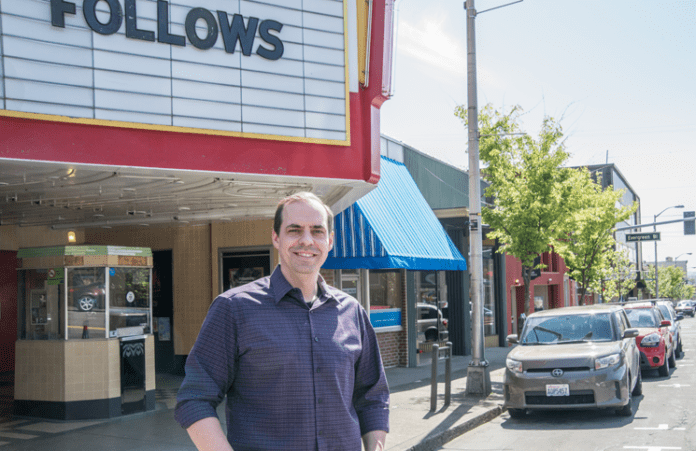In January 2014, Kiggins Theatre owner Dan Wyatt began talking with George Golden about the status and future of the building right next door to the Kiggins. This March, Wyatt purchased the building for approximately $650,000. With this purchase, Wyatt (and his wife and parents, silent business partners) now owns most of the storefronts along the east side of Main Street’s 1100 block. As he transitions from neighbor to landlord, he is also looking ahead to the future of his business and of Vancouver’s downtown.
The building complex Wyatt now owns is a bit of a puzzle. The movie theater itself is part of a larger building, which also contains storefronts to the north: Niche Wine & Art Bar, Angst Gallery and Moxie Salon. When Wyatt bought that building a few years ago for about $1 million, he became landlord to those tenants. The building immediately to the south of the theater zigs and zags a bit: the storefronts it contains are Pip Printing and North Bank Gallery to the south, and Jerusalem Cafe, which actually fronts on Evergreen Blvd. The building at the southern corner of the block, which contains Rosemary Cafe, is its own separate building.
Wyatt previously owned and ran Pop Culture, which was located on Main Street in Vancouver’s Uptown Village. In early 2012, he took over management of the single-screen Kiggins Theatre from owner Bill Leigh. From there, it wasn’t long until he bought the building.
“I realized that running the theater just wasn’t going to be viable unless I stopped paying rent and actually owned the building,” Wyatt said. “I wasn’t looking to be a landlord necessarily, but it was the only business proposition that made sense.”
His logic was the same in buying the building next door.
“I don’t have immediate plans for expansion,” he said. Current tenants have leases and agreements, and he doesn’t intend to disrupt their flow.
“I don’t want to be a stereotypical landlord looking at tenants as revenue streams and not as neighbors,” Wyatt added. “If I can be a benefit or support to the other businesses … that’s my goal.”
In the long run, Wyatt said he does want to look at expansion for the theater.
“We need more auditoriums,” he said. “Having more screens means you can increase inventory without increasing overhead,” and that model is the only way to make a small, independent theater successful, “according to others in the industry.”
However, he pointed out, “That’s a ways off. If a vacancy comes up there may be an opportunity, but it was never my intent to come in and shake things up right away.”
In the meantime, Wyatt plans to put some work into maintenance and repairs for the old, but new-to-him building.
“We lowered the purchase price to account for some work that had to be done,” he said. That includes some roofing, some electrical and plumbing – routine work for a building that’s nearly 100 years old.
“Nothing is dire,” added Wyatt, “but we want to get in and take care of it during the transition, before anything would become a problem.”



